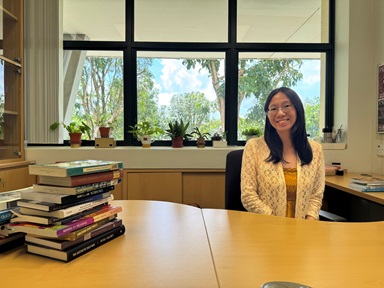Revolutionising healthcare education with an interdisciplinary skillset
As an operating theatre nurse, Ms Yu Xinran realised that educating patients about their procedures and wound care went a long way in ensuring better health outcomes. “Enhanced patient education can help patients to understand optimal self-care methods and minimise unnecessary hospital visits,” she explained.
Ms Yu also discovered that she was adept at streamlining paperwork and documentation for nurse clinicians. This proficiency, coupled with her conviction in the transformative power of education, spurred her decision to enrol in the Master of Science (Science of Learning) programme at the National Institute of Education, Nanyang Technological University, Singapore (NIE NTU, Singapore) in 2022.
“I wanted to formalise my passion for education and transition toward delivering healthcare education to new and aspiring practitioners,” she said.
Choosing NIE for its strength in educational research and programme quality, Ms Yu found herself in a vibrant environment valuing innovation and academic contributions to the field of education. “The Master of Science (Science of Learning) programme is unique, as it offers an interdisciplinary approach with a strong scientific foundation,” she added.
Professionals seeking to advance their studies at NIE can select from a wide spectrum of over 30 graduate programmes crafted to cater to the learning needs of individuals in various education-related sectors and industries.
INTEGRATING NEW DISCIPLINES INTO HER LEARNING
Although the choice to resign from her job and pursue full-time studies was a challenging one, Ms Yu remained resolute in taking this pivotal step toward the career and specialisation she was passionate about.
Going out of her comfort zone extended beyond a return to school. The broad-ranging Master of Science (Science of Learning) programme delves into several fields, including neuroscience, psychology, cognition and technology. Ms Yu was introduced to unfamiliar disciplines like programming, which she deemed “interesting and difficult”.
“I struggled with programming because I had never been exposed to it,” she admitted. “But with the support of my classmates and teaching faculty, I came to appreciate how fun programming is and its significance in understanding neuroscience and psychology.”
Beyond honing her problem-solving and reasoning skills, Ms Yu was intrigued by how data analysis and programming could help clinical educators better assess students’ learning outcomes.
As part of the programme, she also acquired a comprehensive understanding of the applications of artificial intelligence (AI) in tailoring students’ learning experiences based on their individual interests and strengths.
“The diverse interdisciplinary courses gave me a holistic understanding, enabling me to glean insights from a broad spectrum of perspectives and approaches across multiple disciplines,” she said.
Ms Yu highlighted the synergistic partnership between NIE and NTU’s Lee Kong Chian School of Medicine (LKCMedicine) as an additional wellspring of insights into the intricacies of human learning.
“The focus on brain function and cognitive neuroscience in a course at LKCMedicine provided the biological foundation to complement our own programme’s course on the neuroscientific basis of learning,” she recalled. “Neuroscience was new to me, and the materials and facilities provided by the professors helped me to understand and appreciate the subject better.”
Navigating unfamiliar topics was made easier by innovative teaching methods such as collaborative knowledge building. In this approach, Ms Yu and her classmates engaged in reading various scientific papers together, fostering a collective understanding and gaining insights into translating scientific research effectively into educational practices.
“I was glad to have classmates from different industries,” she said. “Their varied perspectives, particularly on topics like education-related policies and teaching experiences, enriched our classroom discussions and gave me useful knowledge beyond the healthcare system.”
BRINGING AN INTERDISCIPLINARY SKILLSET TO CLINICAL RESEARCH
Students in the Master of Science (Science of Learning) programme can choose to do coursework or a dissertation in their final semester. Opting for coursework, Ms Yu completed an integrative project assessing the impact of socio-emotional learning on reducing academic burnout among nursing students.
Since July, Ms Yu has been working as a clinical research coordinator in a local medical school. She assists physicians in recruiting patients for medical research and educates patients about their medical conditions. Inspired by her education, she has begun exploring how data analysis can streamline processes and elevate research efficiency.
“I aspire to enhance patient education and, in the future, contribute a multidisciplinary perspective to the role of clinical research assistants by integrating AI, technology and psychology,” she said.
Reflecting on her NIE journey, Ms Yu considers it her most fulfilling learning experience, crediting the stimulating academic environment for boosting her skills and confidence.
“Helping patients requires more than just nursing expertise,” she said. “The interdisciplinary mindset inculcated by the programme at NIE equips us with a more expansive knowledge base, so that we can thrive in the healthcare system.”
Applications for coursework and research programmes are open until Jan 12 and Jan 31, 2024, respectively.
Read the original article here.
Source: Channel NewsAsia © Mediacorp Pte Ltd. All rights reserved


.tmb-listing.jpg?Culture=en&sfvrsn=4e7824a_1)

.tmb-listing.jpg?Culture=en&sfvrsn=a7db34c2_1)


